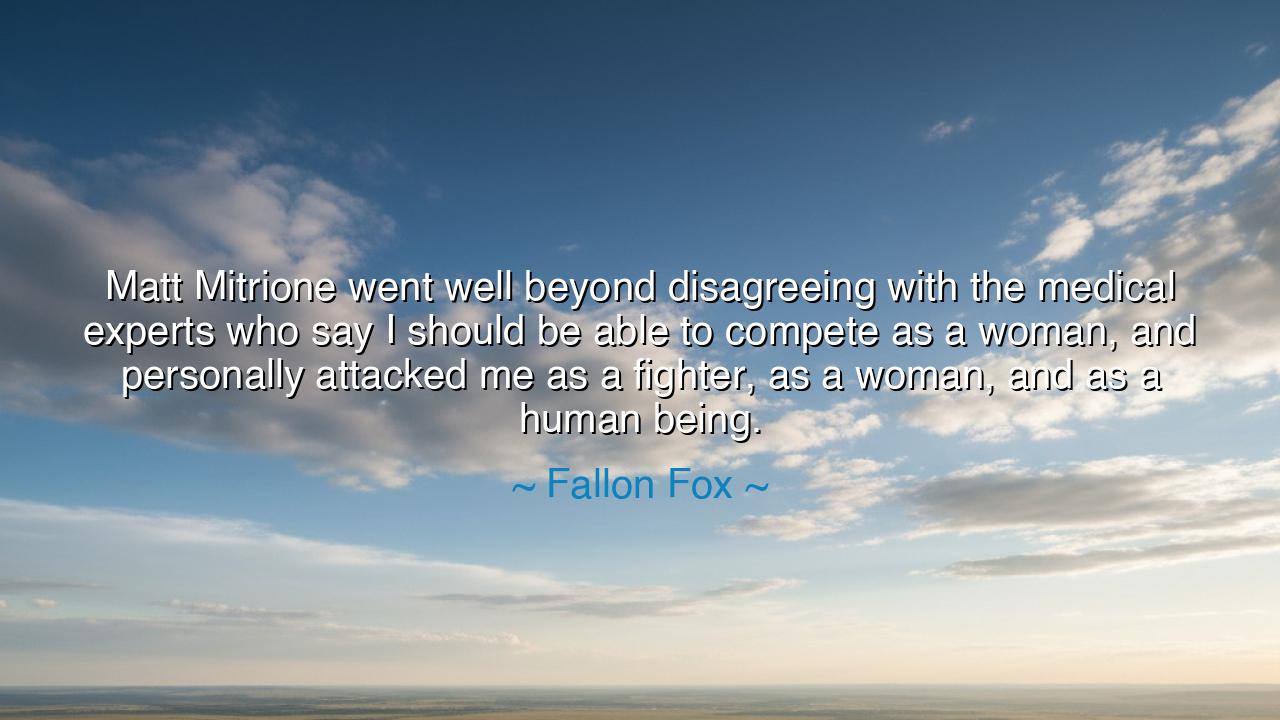
Matt Mitrione went well beyond disagreeing with the medical
Matt Mitrione went well beyond disagreeing with the medical experts who say I should be able to compete as a woman, and personally attacked me as a fighter, as a woman, and as a human being.






Hearken, O seekers of justice and understanding, to the words of Fallon Fox, who declared: “Matt Mitrione went well beyond disagreeing with the medical experts who say I should be able to compete as a woman, and personally attacked me as a fighter, as a woman, and as a human being.” Within this statement lies not only the cry of one who has endured the sting of prejudice, but also the timeless struggle of the human soul to be seen, respected, and accepted in truth. It is the lament of one whose identity has been questioned, whose worth has been challenged—not by reasoned debate, but by the cruelty of scorn.
Fallon Fox, the first openly transgender woman in mixed martial arts, stood at the crossroads of courage and controversy. Her presence in the fighting arena—an embodiment of both strength and vulnerability—provoked fierce debate about fairness, biology, and identity. Yet, in her words, the wound runs deeper than argument. It is not disagreement she condemns, but dehumanization—the moment when discourse ceases to seek understanding and becomes an assault upon one’s being. For when a person is stripped of respect, their humanity itself is called into question, and in that act, society wounds not only them but its own moral heart.
The story of Fallon Fox echoes across the ages, for the pain of misunderstanding and exclusion is as old as civilization itself. Recall the philosopher Hypatia of Alexandria, a woman of knowledge in a world ruled by men, whose intellect and independence made her both revered and reviled. When hatred overcame reason, she was dragged through the streets and slain by those who feared what they could not comprehend. Like Fox, Hypatia’s truth threatened the comfort of others; like Fox, she suffered not for wrongdoing, but for daring to exist authentically in a world unprepared to accept her.
In her words, Fallon reminds us that identity—whether of gender, faith, or race—is not a topic for ridicule but a truth to be honored. Her plea is not for sympathy, but for respect: respect for expertise, for human dignity, for the sanctity of selfhood. To disagree is the right of every free mind, but to demean is the mark of a spirit not yet wise. The ancients taught that speech possesses power—the power to heal or to destroy. The Stoics warned that words, when used unjustly, corrode the soul of the speaker more than the one they harm. In this light, Fox’s experience is not only her own sorrow but a mirror for all humanity, revealing how easily we trade compassion for cruelty.
The heart of this quote lies in the distinction between disagreement and disrespect. A society may debate fairness; it may wrestle with law, science, and ethics. But when those debates abandon empathy, they cease to serve truth and become weapons of division. True strength is not found in winning arguments but in honoring the humanity of one’s opponent. Even in combat sports—where fists may clash and victory is sought through force—there must remain a deeper code: to fight with honor, not hatred; to oppose, but never to demean.
The lesson is luminous: those who walk paths of controversy must be met with curiosity, not contempt. The healer, the teacher, the athlete, the outcast—all seek only the same simple grace: to be judged by their deeds, not denied by their nature. To disagree wisely is to build understanding; to attack blindly is to destroy the very bridge that leads to peace. As the ancients knew, respect is the breath of civilization—without it, words become weapons, and hearts grow barren.
Practical wisdom flows from this truth: speak always with compassion, even when conviction burns within you. Challenge ideas, not identities. Defend your beliefs, but never at the cost of another’s dignity. For in respecting even those with whom we differ, we honor the divine spark that binds all souls. The measure of a person’s strength is not in how loudly they triumph, but in how gently they uphold the worth of others.
O seeker of understanding, remember this: Fallon Fox’s words are not merely about sport, but about the eternal struggle for respect. Her pain is a lesson, her courage a torch. Let her experience remind you that humanity’s truest victory lies not in conquest or dominance, but in the recognition of every soul’s right to be—whole, respected, and free.






AAdministratorAdministrator
Welcome, honored guests. Please leave a comment, we will respond soon